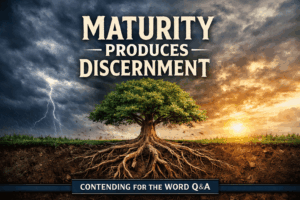⏱️ Estimated Reading Time: 9 min read
One way we can truly help others is to show comfort during times of stress, fear, or anxiety. We can do this joyfully to bear one another’s burdens and encourage one another (Galatians 6:2; 1 Thessalonians 5:11). Many of us struggle, however, on a personal level with anxiety. Anxiety is a difficult topic to address for various reasons, and many people have written helpful books and given wonderful sermons on this topic. As Christians, we should readily apply the same encouragement and verses to our own difficult situations since we believe what Scripture says by God’s grace. But, for many believers (myself included), that can be an ongoing and sometimes difficult process. When anxiety is a continuing reaction for us, we need to realize that we may not be applying the truths of Scripture to our own personal hardships and trials. Let’s consider how we can work on trusting the Lord more when we reflect on God’s sovereignty, when we examine our responses biblically during times of anxiety, and when we take proactive steps to minimize anxiety’s grip on our daily lives.
Is God Sovereign?
It’s not always easy for us to be humble and admit that God is sovereign in the midst of our struggles, even though we truly believe the verses we share with others. Why? One reason is that even though we believe in our minds that God is sovereign, we often do not do well in translating it into our hearts. We often try to be the ones in control. Philippians 4:6 reminds us, “Do not be anxious about anything, but in everything by prayer and supplication with thanksgiving let your requests be made known to God” (ESV). That verse includes the words “do not.” That is an imperative, which is a command. It’s important to continue to read the next verse, “And the peace of God, which surpasses all understanding, will guard your hearts and your minds in Christ Jesus” (Philippians 4:7 ESV). How wonderful to read that verse carefully. He will give us peace, and that peace will guard our hearts and our minds!
Many Bible teachers address and explain anxiety in helpful ways as it relates to our Christian lives. Jerry Bridges, in his book, Respectable Sins, says, “If I give way to anxiety, I am, in effect, believing that God does not care for me and that He will not take care of me in the particular circumstance that triggers my anxiety of the moment (page 64).” John MacArthur helpfully adds, “Worry at any time is a sin because it violates the clear biblical command. We allow our daily concerns to turn into worry and therefore sin when our thoughts become focused on changing the future instead of doing our best to handle our present circumstances” (Anxious for Nothing, pages 10-11). R.C. Sproul shares that: “Even if the Christian cannot rejoice in his circumstances, if he finds himself passing through pain, sorrow, or grief, he can still rejoice in Christ. We rejoice in the Lord, and since he never leaves or forsakes us, we can rejoice always” (Can I Have Joy in My Life?).
Examining our responses during times of anxiety is critical.
One of the ways in which we often handle anxiety is by reacting to difficult situations rather than responding to them. It’s part of our natural way of thinking. However, when we are saved, we become new creations in Christ. Galatians 2:20 clearly states this new nature: “I have been crucified with Christ. It is no longer I who live, but Christ who lives in me (ESV).” In addition, 2 Corinthians 5:17 clarifies this clearly: “Therefore, if anyone is in Christ, he is a new creation. The old has passed away; behold, the new has come” (ESV). Alistair Begg reiterates this when he says, “Sin may remain in the believer’s life but it no longer reigns…Though perhaps not yet fully destroyed, it has been dethroned (Truth for Life blog, 8/16/21).” This means that we will still have to address how we manage anxiety daily, which will require us to do so differently than we did before coming to saving faith in Christ. As we grow in knowing the Lord after conversion, we can grow in understanding that there is a different way to manage our anxiety day by day.
Some considerations in thinking biblically about anxiety:
- We need to know how we are feeling when dealing with anxiety. It is not sinful to understand and acknowledge how we are feeling or what emotions we are experiencing in a given situation. It is important, however, that we do not dwell on our feelings too long since that will often mean allowing unresolved discouragement or fear to remain. Next, we should look at how to deal properly with our anxiety, worry, and emotions in these situations. Although it is often misused, Philippians 4:13 is an important verse in helping us deal with anxiety biblically: “I can do all things through him who strengthens me” (ESV). Reflecting on this verse properly can help us to place our focus on Christ, not on ourselves, which helps us to look at anxiety through a biblical lens. Remember that God is still sovereign in times of anxiety. We cannot address anxiety properly until we commit to understanding that Christ is sovereign and that He is with us in every situation in life. This is a meaningful shift for many of us in how we handle anxiety differently as Christians. No one intrinsically wants to navigate difficulties in life, but we know that painful situations are part of life. Stopping at the moment and recalling that God is with us and that He is for us can often be an incredibly helpful first step. If we don’t do this, we can revert to old patterns of despair, discouragement, or fear instead of looking to God in our hardships.
- Lastly, remember that God is working out His purposes for our lives, even during times of anxiety. Romans 8:28 reminds us that “…We know that for those who love God all things work together for good, for those who are called according to his purpose” (ESV). God has plans for our afflictions, even when we do not understand them, so we need to be mindful of how to begin to deal with anxiety biblically.
Focus on manageable steps in dealing with anxiety:
- Read God’s Word regularly. This needs to be a priority all the time, and it seems like such an obvious course of action, but particularly so in guiding our hearts and minds during times of anxiety. Take time to read and meditate on God’s Word. Scripture will provide encouragement and comfort during times of struggle or hardship. Write down Bible verses on index cards or post-it notes, and read them often in order to be encouraged throughout the day. Start with verses such as Psalm 34:4; Psalm 34:17; Psalm 55:22; Psalm 94:19; Isaiah 41:10; Matthew 6:34; Matthew 11:28-30; Luke 12:25-26; John 14:1; John 14:27; Philippians 4:6-7; 1 Peter 5:7.
- Pray often. This is one of the things we sometimes actually neglect to do when we are anxious or when we experience hardships. We need to pray to our Heavenly Father so that we can open our hearts and commune with Him. Prayer should be an important part of a believer’s day. We must pray with a strong focus on God’s Word.
- Connect with others in your local church. Be in fellowship with other believers often. Talk with trusted sisters and brothers at church and with close Christian friends on a daily basis who can support you when you are feeling anxious, overwhelmed, or discouraged. Connection with others can be one of the most helpful ways we can begin to heal and work through our anxiety.
- Find sound Biblical resources that will support you in working through anxiety. Myriads of resources address the topic of anxiety, from Bible apps to various devotionals to sermons and books. Some books include Anxious for Nothing by John MacArthur and Knowing God’s Peace by Paul Tautges. When I am Afraid by Ed Welch, Stressed Out by Todd Friel, and Spiritual Depression by Martyn Lloyd-Jones. In addition, many solid Bible teachers have sermons that address anxiety.
In summary, we need to remind ourselves that God is truly sovereign. We should examine our responses to anxiety carefully, for only then can we take steps toward thinking more biblically about anxiety. Finally, we can shift how we handle anxiety. Doing these things may not alleviate anxiety completely, but they will help us to find greater joy in Christ in our daily lives. We can learn day by day to repent and see God more for who He is, as revealed in His Word, instead of keeping hold of the proverbial “reins” regarding our anxiety. It is a daily process for many of us. How reassuring to know that with God’s help, we can begin to make meaningful shifts in how we approach anxiety and begin learning to trust God more fully as the author and perfecter of our faith (Hebrews 12:2 NASB), knowing that “He will guide us forever” (Psalm 48:14 ESV).
Author’s Notes:
Anxiety is often a lifelong battle; in some ways, it can be a chronic condition for some people. I readily acknowledge several things. First, I am not a physician or Biblical counselor. I speak from my own experiences and how I have tried to respond to encouraging others in times of anxiety and hardships by God’s grace and from a Biblical perspective. Secondly, I believe that in some instances (combined with prayer, Bible reading, and fellowship with other believers), medication or supplements can sometimes provide helpful assistance to people with more problematic anxiety. However, that is not the scope of this article. Thirdly, it is not my intention to try to explain away or be dismissive in any way regarding very real situations when anxiety can be more of a long-term struggle in life. What I aim to address in this article is related to more of a mild to moderate type of anxiety, which I have personally experienced. I hope to try to encourage and give hope to others to live more joyful lives for Christ.




